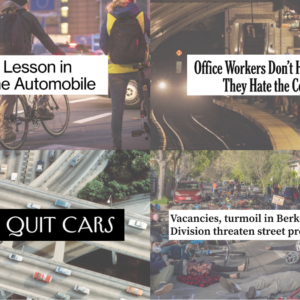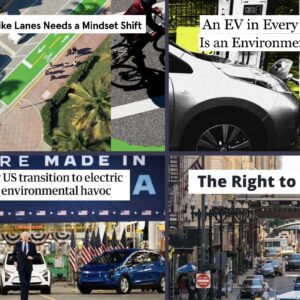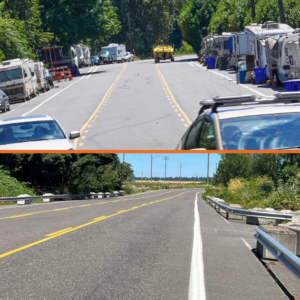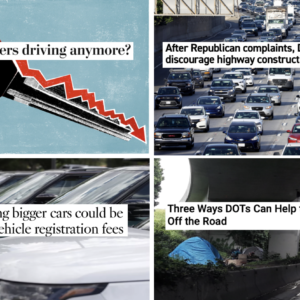“… mass transit advocates block new roads and otherwise penalize drivers in an effort to force them out of their cars, thus making their lives infinitely more difficult.”
— Mark Tapscott, Washington Examiner
A few interesting news items relating to automobiles have come across my desk recently so I thought I’d round them up together.
The first is welcome news about something I’ve wondered about for years now. According to the AP, Toyota will begin selling a louder version of their Prius hybrids. Nearly-silent hybrids might seem cool to some, but for humans walking and biking near them, they can be deadly. The AP story points out that hybrids are twice as likely to have run-ins with people compared to cars with conventional engines. In Japan, the “whirring sound” of an engine will come via a $148 speaker system. Toyota isn’t planning on bringing something similar to the U.S. quite yet.
In other car news, Ford continues their efforts to make their cars more competitive with smartphones and other gadgets in order to woo coveted young consumers into the driver’s seat. According to CrunchGear, “With the quick press of any corner the driver becomes fully engaged with the vehicle’s controls – both on the 8-inch main touch screen and the smaller dual 4.2-inch instrument cluster screens.” It’s like a driving inside a laptop computer — you can even personalize the home screen wallpaper. Makes me wonder… Will there be a point where the push for in-car technology runs right up against the push against distracted driving?
And finally, bringing it all together, is a rather amazing opinion piece in the Washington Examiner. Writer Mark Tapscott attempts to draw a line from our society’s love of mobile phones and cars to a reason to oppose net neutrality and mass transit (or, I assume anything that “blocks new roads” or “forces” people out of their cars). I’ll let Tapscott do the talking:
“See the connection? We love our mobile phones and our cars because they enable us to do so much more. That’s why we can’t get enough of them, making and improving them creates jobs for thousands of people and economic opportunities for millions, the world is made smaller through them, and our lives are richer and more rewarding because of them.
But some folks want to limit or even take away our mobility and convenience. Advocates of “net neutrality” and mass transit, for instance, share an obsession with using government power to force the rest of us to accept less mobility and convenience.
By preventing companies from charging progressive fees for Internet traffic, customers would have to settle for lowest-common-denominator service. Similarly, mass transit advocates block new roads and otherwise penalize drivers in an effort to force them out of their cars, thus making their lives infinitely more difficult.”
See the connection?!?
That’s all the car news that’s fit to print.







Thanks for reading.
BikePortland has served this community with independent community journalism since 2005. We rely on subscriptions from readers like you to survive. Your financial support is vital in keeping this valuable resource alive and well.
Please subscribe today to strengthen and expand our work.
That Washington Examiner article made me furious (and spam my Twitter feed with rage-filled tweets). I mean, really, how DARE we have public transit and net neutrality! Like public health care, they would bring us just one short step away from communism and eating our babies for breakfast.
And yes, please, let’s continue to cram as many gadgets into our cars as is humanly possible, because drivers NEED more distractions. Of course, the people most at risk from distracted drivers are those on foot or on bike, and they don’t deserve to live anyway, right?
1. Noise pollution is a serious problem. We don’t need more noise, we need other vehicles to be quieter. The tire noise and sound of the electrical whine made by hybrids is quite distinct and can be heard easily when not masked by even louder vehicles. Noise is a sign of inefficiency… all that wasted acoustic energy going out the tailpipe.
2. If hybrids must make noise at low speeds, I vote for the Jetsons sound. Will we have something like ringtones where each vehicle makes a noise chosen by its owner? Imagine all the wonderful music going around… just like loud stereos, only now required by law!
I really still need to know. How does mass transit limit mobility? As far as I can tell, it enhances mobility. For those people that are unable/unwilling to use a SOV, their mobility is greatly enhanced with mass transit.
Oh, Jonathan, I found the perfect way to explain bike infrastructure funding to car people:
You and your family walk into a restaurant. The dining room is full of tobacco smoke. Cigars, pipes, and cheap cigarettes have limited visibility to a mere 30 feet. You turn to the hostess, and say “non-smoking please”. She says, Oh, absolutely, but there is a surcharge for non-smoking facilities.
Yes, the issue is, it’s not bicycle infrastructure, it’s Non-motorized transportation infrastructure. It is designed to protect those that do not drive, from those that do. Thus, the responsibility to fund it comes from those that are creating the hazard.
and one more from just now
http://freakonomics.blogs.nytimes.com/2010/08/23/does-driving-cause-obesity/?utm_source=feedburner&utm_medium=feed&utm_campaign=Feed:+FreakonomicsBlog+(Freakonomics+Blog)&utm_content=Google+Reader
“We love our mobile phones and our cars because they enable us to do so much more.”
This reminds me of the old man in ‘Shawshank Redemption” who is terrified of being released from prison.
please don’t make quiet cars louder… the noisy ones are already way too loud… people need to pay attention… I don’t care if the peds are complaining that they can’t hear them… they need to look where they’re going!
I know that quiet hybrids are still an improvement but we shouldn’t be making things intentionally louder just to get the attention of people that can’t be bothered to look around them…
Darwin is doing his job and I don’t want to mess with that…
…
also, net neutrality has nothing to do with progressive fees for internet traffic, it has to do with blocking specific content… I’m all in favor of charging for traffic via progressive fees, which I believe Comcast is already doing, but I also want net neutrality because I hate censorship…
so keep letting people do their p2p file sharing, just charge them more if they use a lot of bandwidth, but don’t try to cut off the p2p traffic entirely…
You don’t have to look across the country for crazy theories:
http://www.cascadepolicy.org/
Tapscott’s pretty much a shill for the Republican party, which has no financial interest in preserving net neutrality. His bio touts his 2008 Conservative Journalist of the Year award from CPAC, and his former employer was the right-wing Heritage Foundation.
Any discussion of his journalism should include his background up-front; there’s no reason to give his opinions equal footing with unbiased journalism on the subject of net neutrality.
A more balanced insight on the subject can be found here: http://www.npr.org/blogs/money/2010/08/13/129179471/the-friday-podcast-creating-lanes-on-the-information-superhighway
Here are some radical questions:
1. Is the human body really designed to travel at speeds in excess of 15-20 miles an hour on a regular basis without sacrificing health and longevity? Forget about air travel, which scientists already KNOW is damaging to the human body on a microbiotic level — let’s just talk about driving along at 60 or 70 miles an hour on a freeway somewhere, in a car. Can we really say that living at that speed on a daily basis isn’t doing us some harm?
2. Is the human brain really designed to manage more than one or two tasks at a time without sacrificing the quality of the resulting divided attention?
If the answer to these questions is YES, then by all means let’s fill the earth with as many electronic, “time-saving” gadgets as possible; let’s put millions of people to work in factories where these gadgets are churned out by the zillions, and let’s make sure that every child entering first grade is immediately issued a personal data-communication device — and a user ID number, theirs for life and perhaps eventually taking the place of a social security or national ID number.
If, on the other hand, the answer to these questions is NO, then we have no choice but to scrutinize — and discourage — every attempt to make human beings more wired and able to move at faster and faster speeds in transit and work — so that human beings can get back to living on a more human scale, and at a more human (and humane) pace. If “lowest common denominator” communication and travel are slower, they may also be healthier — not only for the earth, but for human beings too.
Read Ivan Illich’s “Energy and Equity” for a more in-depth discussion of these phenomena and how the amplification of electronic living is actually doing humans more harm than good.
Beth, F=MA. Once you understand the importance of that, you’ll be able to tackle your question #1. Combine that with a bit of astronomy and you’re in for some real fun.
(Hint: Driving, walking, biking, or just sitting “still”, you’re traveling at a speed of roughly 1000mi/hr around the axis of the earth, and roughly 65,000mi/hr in our orbit around the sun.)
PS… Please define “microbiotic” in the context you’re using (effects on the body from air travel), as all I can find online are various diets and approaches to “wellness” and “spirituality”.
Beth, I’d love some citation for what scientists know about air travel and human health.
The acceleration involved in a car getting up to sixty is pretty tame — you really suspect some damage is being done to the humans strapped inside from that? What do you think is going on?
“…infinitely more difficult.”
It freezes them in carbonite(tm)?
yes spiffy, but what about blind people?
“Silent” electric cars are hardly so, and the noise technology is a solution without a problem:
http://green.autoblog.com/2010/06/23/chelsea-sexton-were-losing-sight-of-reason-in-the-debate-over/
http://www.youtube.com/watch?v=bMtNkB8iFyI&feature=channel
(go to minute 9:00 for a noise comparison)
When I was in Amsterdam, I thought about having sound effects for bikes . The bikes there are sometimes traveling right next to the curb. You have to really be careful crossing the street because you can’t hear them coming. A device could tie it in to a bike computer and get louder and change pitch with speed. The same could be done with electric and hybrid cars. It would help blind people and everyone else have a second chance to avoid getting hit.
…or instead of inventing fancy gizmos and doohickeys, people could just look in both directions of travel on the street before stepping out into it.
@151 #17
How do you “look” both ways when your “eyes” are your ears? This is for blind people, not for stupid people, although it would probably work for you, too.
The touchscreen is a tough distraction to compete against. Their cost of manufacture is coming down radically and they allow full software implementations with targeted features and localizations. Software solutions have lower NRE costs for auto makers, so expect this practice to become prevalent. Knowing someone who died in a crash while reportedly adjusting a radio that actually had knobs, this terrifies me!
I’ve had many a close call with pedestrians because of my silent transport machine. With no motor, people randomly cross the street right into my path. While 400+ pounds of cargo-bike, cargo and rider won’t do as much damage as a 3000 pound car, it’ll certainly leave a mark. Quiet vehicles are all around us, not just the electric ones.
smartphones are what makes mass transit great, you can’t be driving a car, riding a bike, or even walking and at the same time reading a newspaper or catching up on email on your smartphone. Ever since I got mine I am all the more likely to let someone else do the driving. Just like if they put Wi-Fi in the amtrak it will make it an attractive option even if it is slower because I can enjoy the trip and get things done instead of being stuck behind the wheel.
I drive a Prius on the occasion that I drive, and I do have an issue with cyclists flying out of the bike lane in front of me and making stupid turns in front of me. They don’t hear me so they don’t even bother looking behind them.
If cyclists just LOOK before they change direction, hybrids aren’t a problem. 99% of the time I’m on a bike, and I look when I change direction in case there is a Prius or another bike behind me. Eugene is practically the Prius capital of the world, and I survive just fine because I use my EYES as well as my ears.
I prefer people driving hybrids because car noise is bad for me.
As for blind people, that’s what stoplight crosswalks are for. They have to be listening for silent bikes anyway.
re: blind people: look out for them… they don’t step quickly into any streets unless they’re also stupid… having your car be louder won’t help you see blind people… it also won’t help the blind people see quiet non-motorized transport which could also cause serious harm…
beth h (#9) – Adding a bit to your excellent points:
1. According to Ivan Illich, no – and I agree with him. One of his essays on transportation (the one you referred to in your post) can be found on the Clever Cycles website:
http://clevercycles.com/energy_and_equity/
2. Most studies have settled on 3-7 things that the human brain can hold in working memory simultaneously and 3-5 tasks. Driving is more than one task – at the least, it involves coordinating the controls with desired direction (1) and speed (2), judging the car’s relationship to the objects around it (3) and scanning for other objects which might intersect it (4). If you’re carrying on a conversation in the car (or listening to talk radio), add another task – now you’re saturated. Any additional tasks result in one or more tasks being done at reduced capacity, or temporarily ignored.
I think many people are unaware of concepts like cognitive load, or how the brain processes information. For example, how many people know that their brain can render cyclists, pedestrians and other cars invisible? If another object is in one’s peripheral vision, and moving in relation to the car at the same rate as the scenery behind it, the brain will edit out that object because it blends with the background. Likewise, some objects which move against the background will be edited out if they move at the same speed as the driver – the brain does this to compensate for specks (floaters) inside the eye. Under these conditions, the driver can literally “not see” a cyclist, or a cyclist can “not see” a pedestrian or a car about to hit him or her.
What’s worse is that point #2 becomes more challenging as speed increases.
Bob R. (#10) – I think more important is the kinetic energy equation – Ek=1/2M*V^2
Double the mass, you get twice the impact energy – double the velocity, you get FOUR times the impact energy.
Aaron (#12) – Compare the odds of a traffic accident at 60 versus at 30. Since reaction time is a fixed value, higher speeds are more dangerous inherently, since a far greater distance is covered at speed. Eventually the deleterious effects of higher speed outweigh the benefits, which is Illich’s argument. Not sure exactly how he comes up with 15mph as the balance point, but I would definitely agree that the balance flips before 35mph.
Zaphod (#20) – I’ve had similar encounters, and now when I see a pedestrian walking towards the street and not looking my way, I ring my bell – it’s been quite helpful a few times. (not implying you don’t – just sharing my preferred method)
Seager (#22) – You’re absolutely right that cyclists should look, but there is some shared responsibility. One thing I wish they would emphasize more in driver training is that anyone on the road can suddenly become unpredictable, and that every operator (regardless of mode) has to be alert for anyone else on the road to suddenly change lanes into their path. It’s entirely possible a cyclist may have to swerve at the last second to avoid a poorly-visible obstacle in the road – they may not have time to look back while reacting, and in those cases the cyclist may be relying on other senses like sound to determine how best to handle the situation.
That said, the reactive case is in the minority, I think. Most of the time, it’s people not being alert and checking the other lane before moving into it.
Matt P, #24, that was a very informative post. Thanks!
Oh sheesh, the “noise pollution” argument again. Talk about a red herring! Making extremely quiet cars louder – BUT STILL QUIETER THAN THE AVERAGE CAR – will not contribute significantly to noise pollution! Trucks and motorcycles can be 30dB louder than even “average” cars. Let’s get them quieted down before whether we worry that hybrids will be too noisy. If you really care about noise pollution, you’ll work to do something about diesel pickups and a certain brand of motorcycles that seem intentionally designed to be much louder than everything else.
In any event, vehicles are DEADLY WEAPONS, for crying out loud. They SHOULD make some noise to warn of their approach. I don’t want vehicles to be silent unless they weigh under 500 pounds – like bicycles!
I do agree that silent hybrids aren’t a significant safety problem on faster streets, because above 15-20mph, tire noise typically drowns out engine noise.
Where it IS a problem is at lower speeds:
1. Parking lots. Spend an hour observing the parking lot at the 7 Corners New Seasons, where a very large share of the cars are hybrids. I guarantee you will see at least one close call between a pedestrian and a Prius operating in electric mode.
2. Slow residential streets. I live on a quiet street where cars are frequently drive only about 15mph, or even slower when preparing to turn onto the extremely narrow side street by my house. I’ve been out near the corner gardening or carrying out the garbage can, and on multiple occasions been startled to see hybrid vehicles going by that I didn’t hear coming. And we have a LOT of kids in the neighborhood. We teach and we nag and we remind, but kids still sometimes forget to look. And it’s no longer safe to assume that drivers are paying enough attention pay extra attention at corners and look for kids.
Heck, adult pedestrians often forget to look before crossing the street – I think ALL of us cyclists can relate to that, and have had peds dart out in front of us because they relied only on their ears.
Silent cars are a far more serious problem though, because (1) bikes are a lot less likely to maim or kill than cars and (2) cyclists are more likely to be paying attention and alert to the possibility of the pedestrian jumping out.
Yes, hybrids need to make noise. I was walking down the street with my dog (no sidewalks) and suddenly noticed a Prius was following me. I had no idea, it was deathly quiet. This was a residential neighborhood, no other noise, and I couldnt hear it. Fortunately, the driver was patient.
Making a jetsons style noise (or light rail acceleration noise) is GOOD.
Wow! Crazy how some ppl think if you don’t drive your not “living the good life” less of a person for riding or taking public transport, or “un-American” for riding.
Side Note: more ppl drive using cell phone
and eating these days. scary!
Joe
Going out of our way to make quiet cars loud is perverse. the problems lie elsewhere. Noise pollution is a problem, and shouldn’t be a societal goal.
I was just yesterday imagining what it would be like if all cars were equipped with sound-canceling devices rendering road noise effectively silent. That’ll be the day.
When that more-distracting car is available for purchase, we should by rights all be vandalizing any one that we see–these things need to be kept off of the road, and they may need a brick through the window followed by a lit bottle of gasoline to keep them there.
Addenda: I see a marketing opportunity here. Let Toyota offer that speaker system as a US option and, just like phone ringtones, let someone like I-Tunes sell different engine sounds. I can see it now–choose between Shelby Cobra, Camaro Z-28, Ferrari California V-12……………………………
matt picio, please reread beth’s comment. You’re talking about collisions, she’s talking about actually traveling at a high speed relative to the ground period.